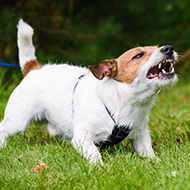
BVA and BSAVA update thier joint policy position on the Dangerous Dogs Act (1991).
British vets are calling for an evidence-based, ‘deed not breed’ approach to dog control legislation for the sake of public safety and animal health and welfare.
In an updated position statement - published ahead of the 30th anniversary of the 1991 Dangerous Dogs Act - BVA and BSAVA reiterate their call to the Government for a repeal of Section 1 of the Act and express concern in defining particular breeds as ‘dangerous’.
The move follows research by the organisations that found no reduction in the prevalence of aggressive behaviour and dog-biting incidents since the institution of the Act. Vets have also voiced concern over the potential negative welfare impacts on dogs seized that are suspected of being a prohibited breed type.
“We have long campaigned for a total overhaul of the 1991 Dangerous Dogs Act because it targets specific breeds rather than deeds and gives a false impression that dogs not on the banned list are ‘safe’,” said BVA senior vice president, Daniella Dos Santos.
“Evidence gathered as part of our recent policy update further supports our view that breed-specific legislation has been ineffective in its intended aims, thereby failing to properly protect the public or safeguard dog welfare over the last three decades.”
Section 1 of the Dangerous Dogs Act bans the ownership of certain breed types perceived as being a risk to public safety. Among these include the pit bull terrier, Japanese Tosa, Dogo Argentino, and Fila Brasileiro.
The recommendations set out in BVA and BSAVA’s updated policy position include:
- repealing Section 1 of the Dangerous Dogs Act (1991)
- effective enforcement and consolidation of existing dog control legislation across the UK
- establishing a centralised dog biting incident database
- promoting safe dog-human interactions and responsible ownership through education and campaign programmes.
BSAVA president Sheldon Middleton said: “Members of the veterinary professions are perhaps more aware than most that any dog can be aggressive, regardless of breed. Canine aggression and dog biting incidents should be viewed as complex public health and social issues, which require a range of prevention strategies including additional research into aggression, the setting up of a centralised dog bite incident database, and education programmes to promote responsible ownership.
“In addition, we would like to see a more focussed approach to enforcement and dog control provisions. Consolidation and rationalisation of legislation, which is currently fragmented in nature, would facilitate progress in this area alongside the allocation of dedicated resources to support enforcement and coordination of services in tackling issues at a local level.”



 Birmingham Dogs Home has issued an urgent winter appeal as it faces more challenges over the Christmas period.
Birmingham Dogs Home has issued an urgent winter appeal as it faces more challenges over the Christmas period.